
In honor of the looming streaming debut of The Irishman, we are reflecting on some of Martin Scorsese's more under-the-radar films. We started with Boxcar Bertha, an exploitation picture made with surprising class. Now, we're looking at one of the biggest right turns from any director in film history.
On the surface, the world of Edith Wharton's The Age of Innocence bears little resemblance to anything connected to Martin Scorsese. It's bookended by Cape Fear, an effective if nasty remake, and Casino, which is exactly the kind of film people tend to imagine when they picture Martin Scorsese- a world of gangsters and violence. That image of Scorsese isn't entirely fair. While his filmography consists of famous works like Goodfellas, Taxi Driver, Mean Streets, and Gangs of New York (which reunited him with Age of Innocence's Daniel Day-Lewis), he also made The Last Temptation of Christ, Hugo, Kundun, and Alice Doesn't Live Here Anymore. He may be known for his portrayals of angry, explosive men committing terrible acts, but his films are more diverse than the popular perception of them would indicate.
Set in 1870, The Age of Innocence depicts Newland Archer (Daniel Day-Lewis) as a man who yearns to escape society's constraints but lacks the strength to do so. He longs to thwart societal expectations, unconcerned with the consequences, but he's too connected to that world to truly distance himself. In its own, repressed way, the moral code to which Newland finds himself forced to adhere feels just as rigid and unforgiving as the rules set forth in Scorsese's mafia and gangster pictures. Casting those rules aside may not result in violence, but it could yield exile, which in 1870 could feel just as damning. Unlike Travis Bickle or Henry Hill, Archer has no outlet for his feelings, no means to express his frustration and resentment. He exists in a world in which anger and violent impulses must go unexpressed and restrained.
Looking at the Age of Innocence now, it simmers and pulses with the same urgency as others in Scorsese's oeuvre, but it does so without the satisfaction of a release. Tensions are allowed to build to a breaking point, but there's no expression of that tension. It's a film of longing stares and embraces behind closed doors, passions simmering and waiting to be acted upon.
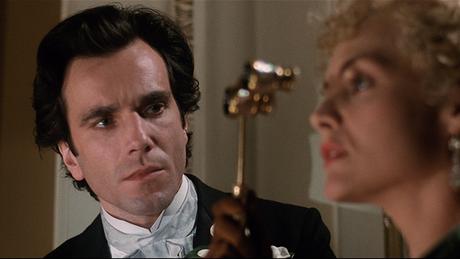
The film's sense of suffocation and repression at times feel overwhelming. Even the interiors, loaded with furniture and paintings and possessions of ornate gaudiness give off a claustrophobic feel, as though one cannot breathe in a world so overstuffed.
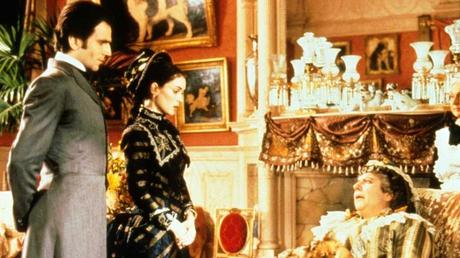
In addition, the film's camera point of view feels constantly in motion, though not in the impressively athletic way you might expect from the man who executed the Goodfellas Copacabana shot. Its not frenetic kineticism. Age of Innocence 's lens moves too slowly for that. Instead, it creates a sense of constantly peering, judgemental eyes, a society in which everything is concealed but nothing is unobserved. It makes the film's (and novel's) title the ultimate irony, as no one is really innocent. It's all a matter of play in order to give the illusion of sophistication and maintain the ability to judge those who fall prey to scandal.
It's in this world that we find our central romantic triangle: Archer, his banal, safe fiancée May (Winona Ryder), and her cousin, Ellen (Michelle Pfeiffer). Before we get to know them at all, we understand the need to push back against such constraints, even when the cost is great. Wharton's characters never say exactly what they're feeling, which is fitting for a world in which everyone must be so carefully guarded.
Instead, both the novel and the film give us a narrator (cinematically voiced by Joanne Woodward) who expresses the thoughts and feelings the characters cannot. As she herself describes 1870s New York: "They all lived in a kind of hieroglyphic world. The real thing was never said or done or even thought, but only represented by a set of arbitrary signs." As a result, we understand that world's constrictions before the narrative has even begun to unfold.
Ellen returns to New York, after a failed marriage to a Polish count who took her money and treated her cruelly, as the source of many raised eyebrows and the subject of societal gossip. She is initially shunned, but May's family's willingness to stand by her allows her eventual reintegration into society's upper tier.
To counteract his feelings for Ellen, Archer impulsively announces his engagement to May, in a futile attempt to wedge himself back within society's norms. Yet, he continues to be drawn towards her, finally realizing he has fallen for her completely. Ellen regards him in the same way, seeing someone who feels as confined by the world around them as she does, with the same longing to escape its clutches. Her willingness to challenge societal standards intrigues Newland, who finds himself drawn to her defined sense of self as he becomes more resentful of May's prosaic simplicity, feelings that only increase after their nuptials.
Again, our Narrator says what Archer cannot: as he stares at May, he wonders "how such depth of feeling could coexist with such an absence of imagination." May comes to represent everything he despises about the culture in which he resides and the embodiment of everything his sense of conformity forces him to abandon. It's probably not entirely fair to her. She was raised to be a pretty, vapid doll, a possession that neither challenges nor thinks too deeply, less a premature wrinkle form mar her countenance.
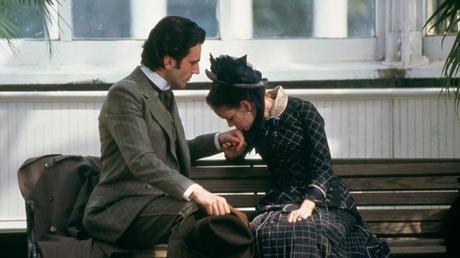
She's just as much a victim of her environment as Archer and Ellen. Yet, she's less aware of the cage in which she resides, which means she doesn't see it for the prison that it is. For Archer, she becomes his prison.
Everything about Archer's life is routine and planned, from his monotonous law job to his benign, passionless relationship with May. We only get a sense of who he truly is when he's conversing with Ellen or sitting in his book-filled library. Ellen's questioning of the world around her must feel like fresh air bestowed upon a suffocating man, and the film's only glimpses of passion come from their interactions. He sees how rich his world could be if he allowed himself to be with her, if he was willing to endure the scandal such a match would cause.
Scorsese uses his rapturous visuals to highlight the contrast between the passionate life Ellen promises and the staid life May represents. Every time he's alone with Ellen, the lighting and color scheme feels warm and rich, especially when contrasted with the virginal, sterile pastels that accompany his interactions with May.
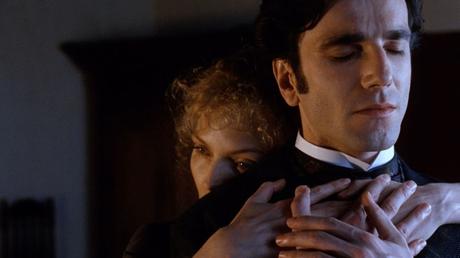
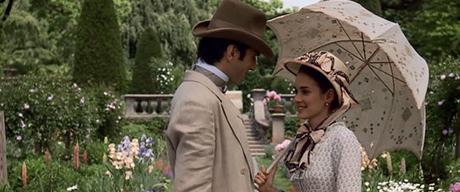
Even the way they're filmed together differs, with Archer often completely sharing closeups with Ellen, while he and May are filmed in medium, less intimate shots.

Eventually, Archer makes plans to free himself and make with Ellen the life he could never hope to have with May. He returns home to her, determined to take a stand, only for May to reveal something to him to him he wasn't prepared to hear and his resolve crumbles. He understands in that moment the consequences of his hasty engagement and ill-conceived marriage, as well as the fact that he has no more cards to play. He's trapped in the banal life he thought, for one brief moment, he would finally escape.
It seems almost pointless to discuss how brilliant Daniel Day-Lewis is here. His mere presence in a film tends to indicate greatness, but Archer Newland is a character who keeps his innermost turnings beneath the surface, leaving Day-Lewis to convey his sense of frustration and longing with mere looks and body language. Honestly, few convey wordless torment quite like Daniel Day-Lewis, who appears to ooze angst from every pore.
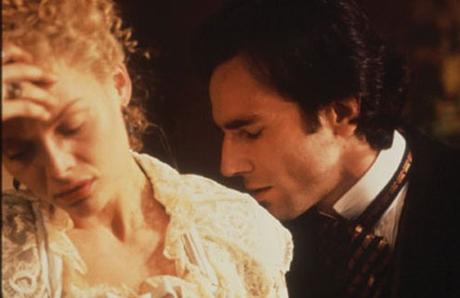
Ryder and Pfeiffer also deliver fine performances, and Woodward's voice lends the proceedings just the right balance of sincerity and irony.
The film ends with a sense of regret and resignation, as aged, widower Newland finds himself with the chance to reunite with Ellen. Again, he shuts himself away from the promise of something more, instead choosing to walk away, back to complacency. As he discusses with his adult son, Ted, the reasons behind the decisions he has made, Ted informs him that May assured the children Newland would provide for them, because "when she asked you to, you gave up the thing you wanted most." Archer's response is heartbreakingly simple: "she never asked."

